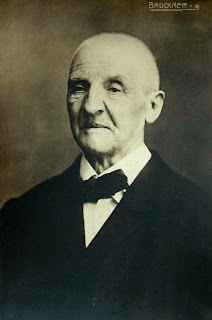Information
Composer: Anton Bruckner
- Symphony No. 2 in C minor (1877, ed. Nowak): I. Moderato
- Symphony No. 2 in C minor (1877, ed. Nowak): II. Andante. Feierlich, etwas bewegt
- Symphony No. 2 in C minor (1877, ed. Nowak): III. Scherzo. Maessig schnell
- Symphony No. 2 in C minor (1877, ed. Nowak): IV. Finale. Mehr schnell
Vienna Symphony Orchestra
Carlo Maria Giulini, conductor
Date: 1974
Label: Testament
http://testament.co.uk/carlo-maria-giulini-789.html
--------------------------------------------------------------------------
Review
A classic recording with still compelling conducting stands the test of time well
Perhaps the greatest of all recordings of the work‚ spacious‚ involved‚ profoundly human’: so wrote Richard Osborne in 1994‚ referring to Carlo Maria Giulini’s EMI recording of Bruckner’s Symphony No 2Ê–Êthen unavailableÊ–Êwhile surveying the thencurrent alternatives in a review of the Chailly/Concertgebouw version on Decca (3/94).
Hearing this digital remastering‚ by Paul Baily‚ of the 1974 EMI original (producer Christopher Bishop‚ Tonmeister Christopher Parker) confirms the sober truth of Osborne’s words. So persuasive is Giulini’s interpretation‚ it makes it almost impossible to take seriously the attempt at a more detached‚ monumental approach found in Daniel Barenboim’s relatively recent Teldec performance (12/98). Giulini’s ability to convey fervour without sentimentality is little short of miraculous‚ and it is clear from the way the early stages of the first movement effortlessly project an ideal balance between the lyrical and the dramatic that this reading will be exceptional. The recording might not have the dynamic range of current digital issues‚ and resonance can sound rather artificial in louder passages. There’s also an obtrusive extension of the trumpet triplets seven bars before the end of the first movement. But such things count for less than nothing in the face of a performance which culminates in a finale of such glowing spontaneity you could almost believe that the orchestra are playing it for the first time‚ and that neither they (nor any other orchestra) will ever play it better.
Richard Osborne provides exemplary annotation‚ filling in the background to the recording itself‚ as well as to Giulini’s attitude to Bruckner. A fuller and more authentic text of the symphony is available at superbargain price in Georg Tintner’s fine account of the 1872 edition. Tintner’s version lasts 13 minutes longer than Giulini’s‚ and serious collectors certainly need both. Yet the last thing you are likely to feel after hearing Giulini is that there is something inauthentic about this Bruckner. Matters musicological fade to vanishing point‚ given such communicative genius.
-- Gramophone
More reviews:
ClassicsToday ARTISTIC QUALITY: 9 / SOUND QUALITY: 9
http://www.classical.net/music/recs/reviews/t/tst01210a.php
http://www.amazon.com/Bruckner-Symphony-No-2-Anton/dp/B00005K3PZ
Different issue:
http://www.classicstoday.com/review/giulinis-radiant-bruckner-second-returns/
http://www.allmusic.com/album/bruckner-symphony-no-2-mw0002658980
http://www.amazon.com/Bruckner-Symphony-No-Wiener-Symphoniker/dp/B00JR56T0Y
http://www.classical.net/music/recs/reviews/t/tst01210a.php
http://www.amazon.com/Bruckner-Symphony-No-2-Anton/dp/B00005K3PZ
Different issue:
http://www.classicstoday.com/review/giulinis-radiant-bruckner-second-returns/
http://www.allmusic.com/album/bruckner-symphony-no-2-mw0002658980
http://www.amazon.com/Bruckner-Symphony-No-Wiener-Symphoniker/dp/B00JR56T0Y
--------------------------------------------------------------------------
Anton Bruckner (4 September 1824 – 11 October 1896)) was an Austrian composer. His symphonies are considered emblematic of the final stage of Austro-German Romanticism because of their rich harmonic language, strongly polyphonic character, and considerable length. Bruckner composed eleven symphonies, scored for a fairly standard orchestra. His orchestration was modeled after the sound of his primary instrument, the pipe organ.
http://en.wikipedia.org/wiki/Anton_Bruckner
http://en.wikipedia.org/wiki/Anton_Bruckner
***
Carlo Maria Giulini (9 May 1914 – 14 June 2005) was an Italian conductor. He was appointed principal guest conductor of the Chicago Symphony in 1969, and was the director of the Vienna Symphony Orchestra from 1973 to 1976. He succeeded Zubin Mehta as musical director of the Los Angeles Philharmonic in 1978, remaining at that post until 1984.
http://en.wikipedia.org/wiki/Carlo_Maria_Giulini
http://www.allmusic.com/artist/carlo-maria-giulini-mn0000661735
http://www.allmusic.com/artist/carlo-maria-giulini-mn0000661735
--------------------------------------------------------------------------
FLAC, tracks
Links in comment
Enjoy!




MEGA
ReplyDeletehttp://adf.ly/1HTcDh
EmbedUpload
http://adf.ly/1HTcDi